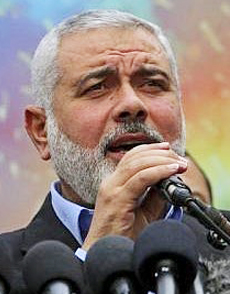
Brief: Hamas Downplays Political Bureau Head’s Meeting with the Taliban and Iran
Publication: Terrorism Monitor Volume: 22 Issue: 9
By:

Executive Summary:
- On May 23, an Afghan Taliban delegation traveled to Tehran to meet with the emir of Qatar and the head of Hamas’s Political Bureau, Ismail Haniyeh. In an effort to downplay bad press as it continues to seek diplomatic recognition, Hamas appears to be trying to minimize its association with Iran and the Taliban as much as possible.
- Previous meetings between the Taliban and Hamas were well-publicized by both parties, whereas focusing on an alliance with global pariahs today would make Hamas less sympathetic on the international stage at a critical juncture. Moreover, it could cut into pro-Hamas support in the West, especially among individuals on the left, who tend to oppose ultra-orthodox Islamic regulations on social matters.
On May 23, an Afghan Taliban delegation traveled to Tehran to meet with the emir of Qatar, Sheikh Tamim ibn Hamad Al Thani, as well as with the head of Hamas’s Political Bureau, Ismail Haniyeh. Although details of their discussions remain undisclosed, the public purpose of the visit was to mourn the deaths of Iranian president Ebrahim Raisi and other Iranian officials during a helicopter crash one week previous (Afghanistan International, May 23). The Taliban subsequently posted photographs from the trip on X, including Haniyeh smiling when meeting with the Taliban delegation.
In contrast, Hamas did not post on X or anywhere else about the Tehran meeting (X/@azelin, May 23). This is unusual. In the past, Hamas would publicize its meetings with the Taliban, especially those that occurred before the Taliban successfully overthrew the U.S.-backed government in August 2021 (X/@JoeTruzman, May 23).
Hamas leader Yahya Sinwar’s strategy in Gaza is to sustain the war with Israel as long as possible, even though this will mean more Gazans being killed in the crossfire. The negative press around Israeli actions stemming from reports of civilian deaths and images of starving Gazans, will, according to Sinwar, cause the world to sympathize with Hamas’s desire to see Israeli forces leave Gaza—and the West Bank, to a lesser extent. Further, Sinwar believes that this will lead to the international delegitimization of Israel (New York Times, May 12). In that sense, Hamas’s success depends largely on getting the West to sanction and put pressure on Israel.
Publicizing their alliance with the Taliban and Iran would likely make Hamas less sympathetic on the international stage. This is especially true with the West, which regards both Iran and Afghanistan as pariah states. It should be noted that Hamas has had some diplomatic victories, to an extent. Since their massacre and hostage-taking in Israel on October 7, Ireland, Spain, and Denmark have all decided to recognize a Palestinian state—though not one where Hamas leads the government (Irish Times, May 22). Other countries may be hesitant to recognize Palestine as an independent state if its rulers are perceived to be in alliance with enemies of the West.
In addition, Hamas has received significant support in the West. In the United States, this has come from both the far left and the far right. Rightist pro-Hamas figures former Ku Klux Klan leader David Duke and the Nick Fuentes-led Groyper Movement and their allies; on the left, Hamas sympathizers include Antifa and the Democratic Party’s “Squad” (Rumble/@NicholasJFuentes, May 28; Odyssey/@MarkCollett, May 8; X/@choeshow, November 18, 2023). This can also be seen in the spate of campus protests that have swept the United States, which have been dominated by progressives (The Hill, April 30). Hamas’s ideological proximity to the Taliban and Iranian Islamic Republic—socially conservative regimes which are well-known for banning homosexual relations and restricting women’s free choice of dress, among other ultra-orthodox Islamic regulations—could generate undesired friction between some of the main left-wing Palestinian supporters in the West and Hamas. Thus, Hamas’s public relations officials may have opted to minimize news or images of Ismail Haniya’s meeting in Tehran as much as possible.



